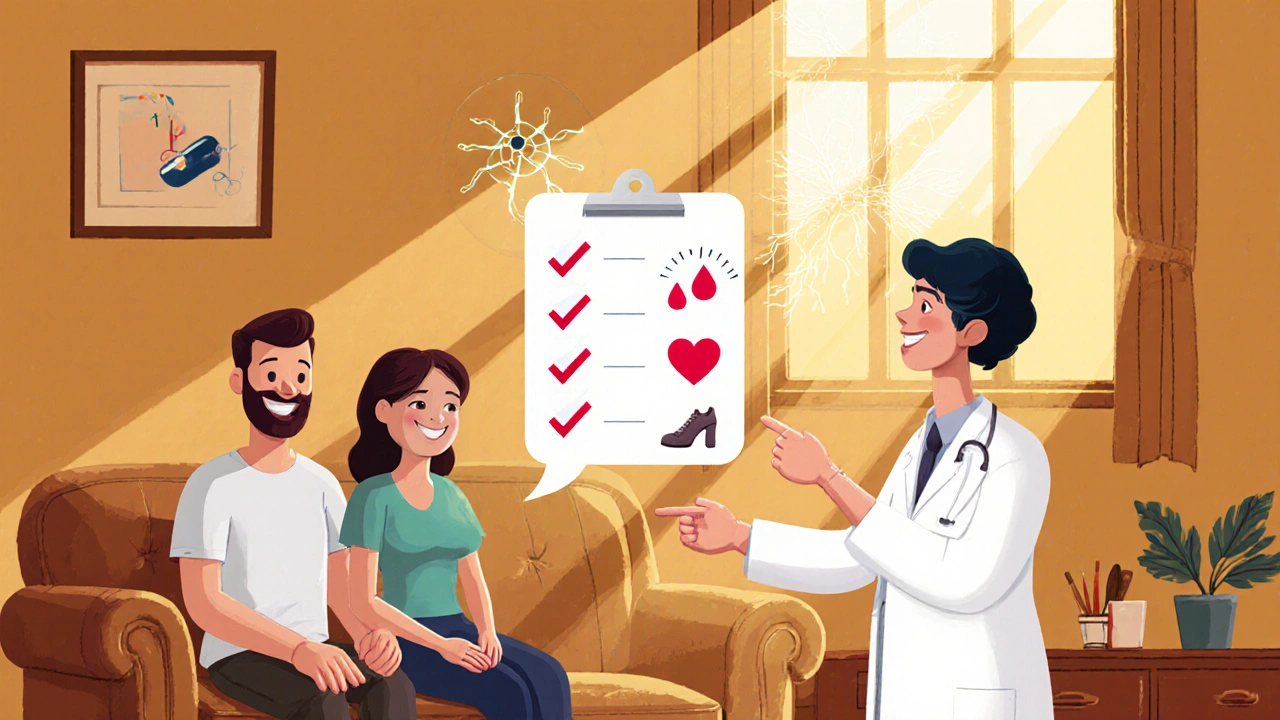Diabetic Neuropathy Sexual Health Assessment
How Are You Feeling?
Answer a few questions to identify potential issues related to diabetic peripheral neuropathy and sexual health.
Your Assessment
Recommended Next Steps
When diabetes starts messing with nerves, it can quietly sabotage your love life. Diabetic peripheral neuropathy is a nerve‑damage condition that often creeps in after years of high blood sugar. It hurts, it tingles, and it can dim the spark between partners. Understanding how this condition intersects with Sexual Health lets you take charge, talk openly, and choose the right treatment before frustration takes over.
What Is Diabetic Peripheral Neuropathy?
Diabetic peripheral neuropathy (DPN) is the most common chronic complication of Diabetes Mellitus. Persistent hyperglycaemia damages tiny blood vessels that feed peripheral nerves, leading to gradual loss of sensation, tingling, burning, or sharp pain-usually first in the feet and hands.
- Prevalence: Around 30-50 % of people with type 2 diabetes develop DPN after a decade of disease.
- Typical onset: 10-15 years after diagnosis, but tighter blood‑sugar control can delay it.
- Key symptoms: Numbness, tingling, burning, and loss of proprioception (balance).
The nerve damage isn’t limited to feeling; it also impairs autonomic nerves that regulate blood flow, sweat, and sexual response.
How DPN Affects Sexual Health
Both men and women rely on a delicate network of nerves for arousal, lubrication, erection, and orgasm. When those nerves are dulled, intimacy can suffer in several ways.
Men: Erectile Dysfunction and Reduced Sensation
Autonomic neuropathy reduces blood flow to the penis, making it harder to achieve or maintain an erection. At the same time, peripheral loss of sensation can blunt the pleasurable feedback that usually fuels sexual activity.
Women: Vaginal Dryness, Decreased Arousal, and Painful Intercourse
Women may notice less natural lubrication, lower clitoral sensitivity, and an inability to achieve orgasm. Vaginal dryness can cause discomfort, making intercourse feel painful (dyspareunia).
Both Genders: Decreased Libido and Emotional Strain
Chronic pain and the anxiety of unpredictable performance often lead to a drop in desire. The emotional toll can create a vicious cycle-stress worsens blood sugar, which worsens neuropathy, which further dampens intimacy.
Underlying Mechanisms: From Blood Sugar to Nerve Signals
Three main pathways link diabetes to sexual dysfunction:
- Vascular impairment: High glucose levels stiffen blood vessels, reducing blood flow to genital tissue.
- Autonomic nerve damage: The nerves that trigger vasodilation and erection become sluggish.
- Peripheral sensory loss: Diminished tactile feedback reduces arousal cues.
These mechanisms often overlap, so effective treatment must address all three.
Assessing the Problem: When to Talk to Your Doctor
Early detection makes a huge difference. Schedule a check‑up if you notice any of the following:
- Persistent numbness or tingling in feet/hands.
- Difficulty achieving erection (men) or adequate lubrication (women).
- Painful intercourse or loss of orgasmic feeling.
- Changes in desire that feel out of character.
Healthcare providers will usually run a physical exam, nerve‑conduction studies, and a review of your Blood Sugar Control history (HbA1c levels, glucose logs).
Management Strategies: Reclaiming Intimacy
There’s no one‑size‑fits‑all plan, but most people benefit from a three‑pronged approach.
1. Tighten Blood‑Sugar Control
Keeping HbA1c below 7 % slows further nerve damage. Consider:
- Continuous glucose monitors (CGM) for real‑time feedback.
- Regular consultation with an endocrinologist.
- Medication optimisation (metformin, SGLT2 inhibitors, GLP‑1 agonists).
2. Targeted Medications for Nerve Pain and Sexual Function
Several drugs help both neuropathic pain and sexual performance:
| Medication | Primary Use | Effect on Sexual Health |
|---|---|---|
| Duloxetine | Neuropathic pain | May improve erectile function by enhancing serotonin/norepinephrine pathways. |
| Gabapentin | Neuropathic pain | Neutral; can cause dizziness, which may affect performance. |
| Sildenafil | Erectile dysfunction | Directly improves blood flow; often used alongside neuropathy meds. |
3. Lifestyle and Physical Therapies
These non‑drug measures work wonders when paired with medical treatment.
- Exercise: Walking, swimming, or resistance training improves circulation and insulin sensitivity.
- Pelvic floor physiotherapy: Strengthens muscles that support arousal in both sexes.
- Sexual counseling: Helps couples navigate anxiety, communication, and expectations.
- Lubricants & moisturizers: Water‑based lubes reduce friction for women; penile moisturizers keep skin supple for men.
4. Advanced Interventions (When Conservative Measures Fall Short)
For persistent erectile dysfunction, options include vacuum erection devices, penile implants, or intracavernosal injections. Women with severe vaginal atrophy may benefit from low‑dose estrogen therapy (if not contraindicated) or laser vaginal rejuvenation.
Communication is Key: How to Talk About It
Silence fuels misunderstanding. Here are practical tips:
- Pick a calm moment: Not during sex, but when you’re both relaxed.
- Use "I" statements: "I’ve noticed I’m less sensitive lately…" rather than "You’re not doing it right."
- Share information: Bring a short article (like this one) to show it’s a medical issue, not a personal flaw.
- Plan together: Schedule doctor visits as a team, experiment with new techniques, and celebrate small wins.

When to Seek Specialized Help
If you’ve tried blood‑sugar optimisation, medication, and lifestyle tweaks for three months without improvement, it’s time to see a specialist. Look for:
- Endocrinologists experienced in diabetic neuropathy.
- Urologists (men) or gynecologists (women) who focus on sexual dysfunction.
- Certified sex therapists who understand chronic illness.
Early referral can prevent the problem from worsening and opens doors to cutting‑edge treatments like nerve‑regeneration trials.
Quick Checklist: Take Action Today
- Monitor blood‑sugar daily; aim for HbA1c < 7 %.
- Report any numbness, tingling, or sexual changes to your doctor.
- Ask about duloxetine or gabapentin for pain; consider sildenafil for erections.
- Start a gentle exercise routine (30 min most days).
- Schedule a conversation with your partner; use "I" statements.
- Book a follow‑up with a specialist if symptoms persist beyond 12 weeks.
Frequently Asked Questions
Can tight glucose control reverse sexual problems?
Improving blood‑sugar levels can halt further nerve damage and, for many, lessen symptoms. Complete reversal is rare, but many patients see noticeable improvement within 6‑12 months of sustained control.
Is duloxetine safe for everyone with DPN?
Duloxetine is generally safe but isn’t recommended for people with uncontrolled high blood pressure, severe liver disease, or those on certain antidepressants. Always discuss potential interactions with your doctor.
What non‑pharmacologic options help women with vaginal dryness?
Over‑the‑counter water‑based lubricants, vaginal moisturizers applied a few times a week, and pelvic floor exercises are first‑line. If dryness persists, low‑dose estrogen cream (prescribed) can be effective.
Are there any dietary changes that influence neuropathy‑related sexual health?
Foods rich in omega‑3 fatty acids (salmon, flaxseed), antioxidants (berries, leafy greens), and low‑glycaemic carbs help protect nerves and improve circulation. Limit processed sugars and saturated fats.
When is it appropriate to consider a penile implant?
If oral meds and vacuum devices fail after a thorough trial (usually 3‑6 months) and the condition severely impacts quality of life, a urologist may discuss implant surgery. Success rates exceed 90 % for satisfaction.
Living with diabetic peripheral neuropathy doesn’t have to mean saying goodbye to a satisfying sex life. By monitoring glucose, treating nerve pain, embracing lifestyle tweaks, and keeping the conversation open, you and your partner can regain confidence and intimacy.


Post A Comment